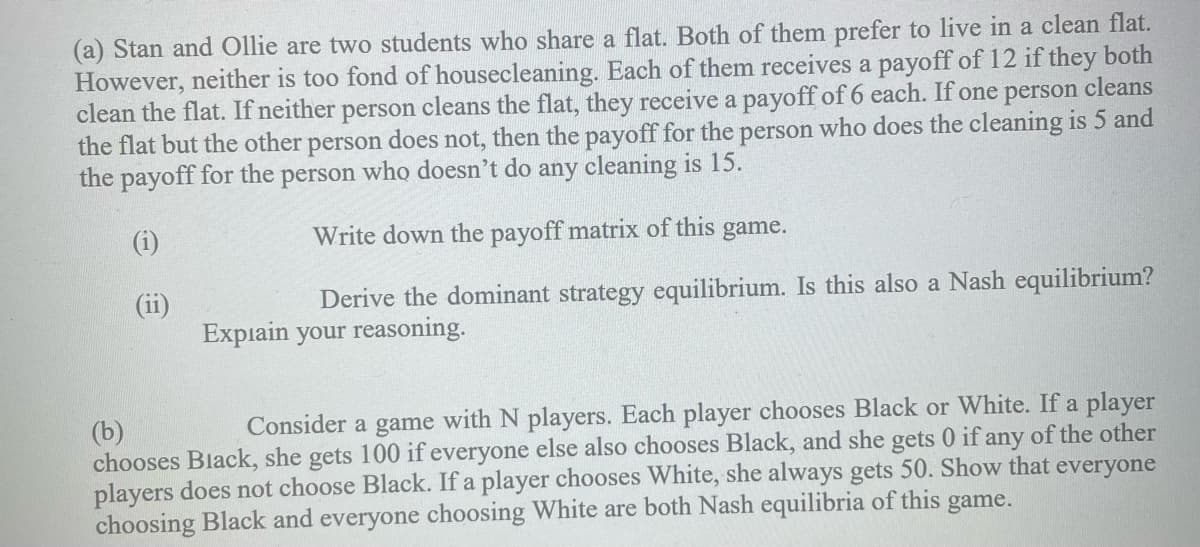(a) Stan and Ollie are two students who share a flat. Both of them prefer to liıve in à clean Ilal. However, neither is too fond of housecleaning. Each of them receives a payoff of 12 if they both clean the flat. If neither person cleans the flat, they receive a payoff of 6 each. If one person cleans the flat but the other person does not, then the payoff for the person who does the cleaning is 5 and the payoff for the person who doesn't do any cleaning is 15. (i) Write down the payoff matrix of this game. Derive the dominant strategy equilibrium. Is this also a Nash equilibrium? (ii) Expiain your reasoning.
(a) Stan and Ollie are two students who share a flat. Both of them prefer to liıve in à clean Ilal. However, neither is too fond of housecleaning. Each of them receives a payoff of 12 if they both clean the flat. If neither person cleans the flat, they receive a payoff of 6 each. If one person cleans the flat but the other person does not, then the payoff for the person who does the cleaning is 5 and the payoff for the person who doesn't do any cleaning is 15. (i) Write down the payoff matrix of this game. Derive the dominant strategy equilibrium. Is this also a Nash equilibrium? (ii) Expiain your reasoning.
Managerial Economics: A Problem Solving Approach
5th Edition
ISBN:9781337106665
Author:Luke M. Froeb, Brian T. McCann, Michael R. Ward, Mike Shor
Publisher:Luke M. Froeb, Brian T. McCann, Michael R. Ward, Mike Shor
Chapter18: Auctions
Section: Chapter Questions
Problem 4MC
Related questions
Question

Transcribed Image Text:(a) Stan and Ollie are two students who share a flat. Both of them prefer to live in a clean flat.
However, neither is too fond of housecleaning. Each of them receives a payoff of 12 if they both
clean the flat. If neither person cleans the flat, they receive a payoff of 6 each. If one person cleans
the flat but the other person does not, then the payoff for the person who does the cleaning is 5 and
the payoff for the person who doesn't do any cleaning is 15.
(i)
Write down the payoff matrix of this game.
Derive the dominant strategy equilibrium. Is this also a Nash equilibrium?
(ii)
Expiain your reasoning.
Consider a game with N players. Each player chooses Black or White. If a player
(b)
chooses Black, she gets 100 if everyone else also chooses Black, and she gets 0 if any of the other
players does not choose Black. If a player chooses White, she always gets 50. Show that everyone
choosing Black and everyone choosing White are both Nash equilibria of this game.
Expert Solution
This question has been solved!
Explore an expertly crafted, step-by-step solution for a thorough understanding of key concepts.
Step by step
Solved in 3 steps

Knowledge Booster
Learn more about
Need a deep-dive on the concept behind this application? Look no further. Learn more about this topic, economics and related others by exploring similar questions and additional content below.Recommended textbooks for you

Managerial Economics: A Problem Solving Approach
Economics
ISBN:
9781337106665
Author:
Luke M. Froeb, Brian T. McCann, Michael R. Ward, Mike Shor
Publisher:
Cengage Learning

Managerial Economics: A Problem Solving Approach
Economics
ISBN:
9781337106665
Author:
Luke M. Froeb, Brian T. McCann, Michael R. Ward, Mike Shor
Publisher:
Cengage Learning